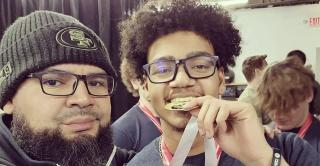
Drop-In Childcare
The Drop-In Center provides support to student-parents/guardians for children between the ages of 3-12 years old, while they attend on-campus classes and/or participate in on-campus events during the Center’s hours of operation. Bathroom independence is required. To use the child care services, children must be fully enrolled in the Central Drop-In Child Care Center program, which includes submission of all enrollment forms and Health Assessment Records. The Drop-In Center child care support services are provided to current Central enrolled student-parents/guardians at no additional cost. Central faculty and staff are welcome to register for child care support for an additional fee.
Once registered, the student-parent/guardian is required to provide a copy of their current class schedule at the time of enrollment, at the beginning of each semester and following the last day of add/drop. Student-parents/guardians are required to inform the Drop-In Center of any schedule changes taking place after the add/drop date. If a student-parent/guardian is attending an on-campus event, (i.e. scheduled event, study session, meetings with university faculty or staff) the student-parent/guardian is required to inform the Center staff of their on-campus location at the time of drop-off.
All Parents/Guardians are required to remain on campus while using the Drop-In Center Child Care support services. Leaving campus terminates your Drop-In Center support privileges.
Pre-K Program
The Pre-K program is open to Central enrolled student-parents/guardians, faculty, and staff for children ages 3-5-years-old, for an additional fee. Bathroom independence is required. To register for the Pre-K program, children must be fully enrolled in the Central Drop-In Child Care Center, which includes submission of all enrollment forms and Health Assessment Records. Additional registration materials are required to complete Pre-K enrollment.
Parents/guardians are not required to remain on campus during this program. A sliding fee scale is available for those who qualify. The sliding scale and application can be found on the website.
Summer Enrichment Program
The Summer Enrichment Program is offered to Central student-parents/guardians, faculty, and staff with children between the ages of 3-7 years old, for an additional fee. Bathroom independence is required. To register for Summer Enrichment, children must be fully enrolled in the Central Drop-In Child Care Center, which includes the submission of all enrollment forms and Health Assessment Records. Specific weeks can be selected with the submission of the Summer Enrichment Registration Form.
Parents/guardians are not required to remain on campus during this program.


